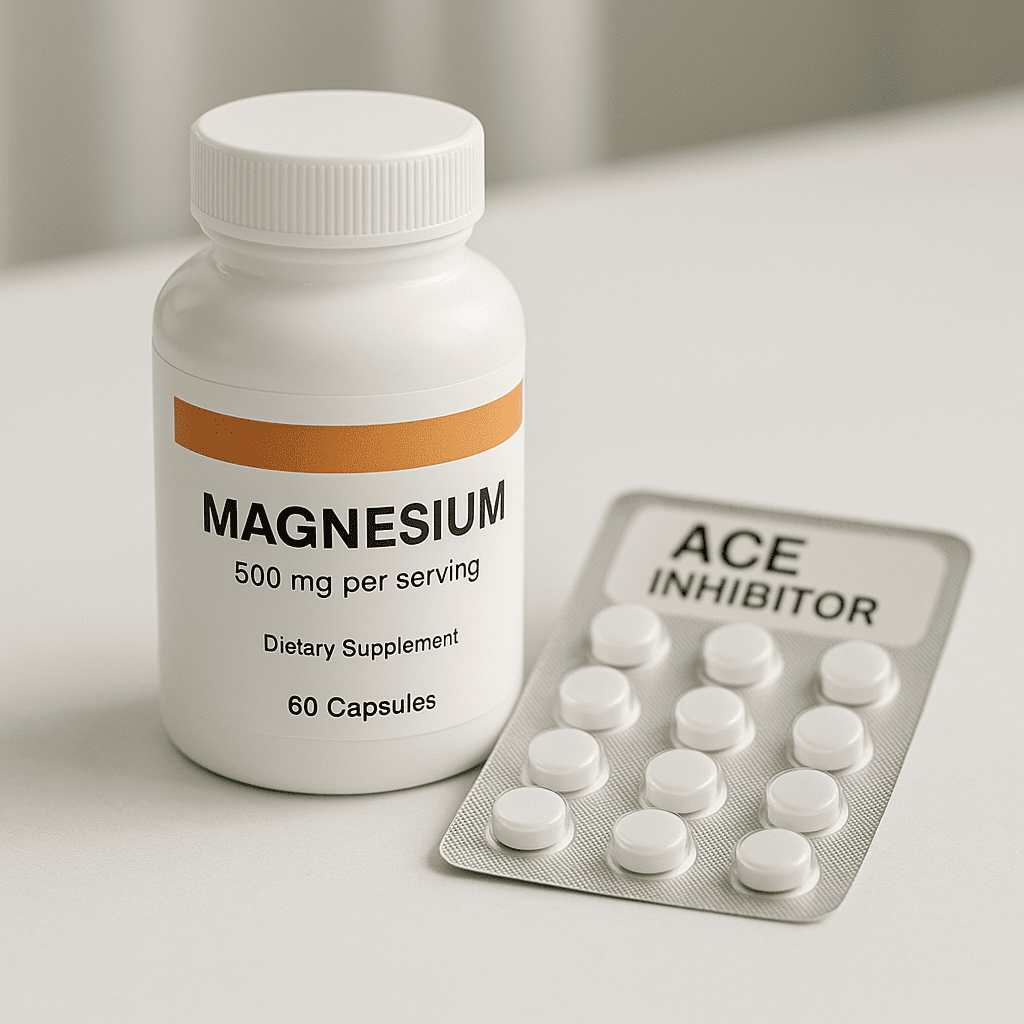Magnesium has long been studied for its role in cardiovascular health, but how does it interact with common blood pressure medications? If you’re considering magnesium with hypertension meds, it’s crucial to understand both the benefits and the potential risks. This guide breaks down what the latest research says about magnesium drug interactions, especially in those taking ACE inhibitors or other antihypertensive.

Can You Take Magnesium with Blood Pressure Medication? [Quick Summary]
Here’s what you need to know at a glance:
- Magnesium can enhance the effects of certain blood pressure medications (like ACE inhibitors and calcium channel blockers)
- Uncontrolled hypertensives may benefit most, especially if magnesium-deficient
- Recommended dose: 240–400 mg/day when used adjunctively
- Common interactions: With calcium channel blockers, diuretics, thyroid meds, and bisphosphonates
- Timing matters: Space magnesium supplements 2–4 hours apart from interacting drugs
- Consult a professional before combining magnesium with BP meds
| Concern | Recommendation |
|---|---|
| Can magnesium lower BP? | Yes, modestly in certain medicated patients |
| Dose for synergy with BP meds | 240–400 mg/day |
| Safe with ACE inhibitors? | Usually, but monitor for hypotension |
| Interaction risk with other meds | High with some (e.g., bisphosphonates, thyroid) |
| Best form for absorption | Magnesium glycinate |
How Magnesium Affects Blood Pressure in Medicated Individuals
Magnesium’s Role in Blood Pressure Regulation
Magnesium is involved in over 300 enzymatic reactions, including those that regulate vascular tone and electrolyte balance. When magnesium levels are low, blood vessels may constrict more easily, contributing to elevated blood pressure.
When Magnesium Makes a Difference
Research shows that magnesium supplementation of 240 mg/day or more can modestly lower blood pressure in patients already taking antihypertensive medications—especially if their hypertension is uncontrolled. In contrast, those with controlled hypertension or normal BP may see little to no effect, even at higher doses.
A 2024 meta-analysis highlighted a 5.78 mmHg drop in systolic BP when magnesium was combined with medications in diabetic hypertensives. This synergistic effect is especially promising for patients with multiple risk factors.
Not a Replacement—But a Complement
It’s important to note: magnesium is not a standalone treatment for high blood pressure. Rather, it works best as an adjunct therapy, amplifying the effectiveness of medications like ACE inhibitors, beta-blockers, and calcium channel blockers.
For more on managing supplement safety with multiple meds, see our guide on safe supplements for seniors on 5+ medications.
Key Magnesium Drug Interactions to Watch For
Interactions with Antihypertensive Drugs
- Calcium Channel Blockers (e.g., amlodipine, diltiazem): Magnesium can enhance their vasodilating effects, which may cause excessive drops in blood pressure. Monitor closely for dizziness, fatigue, or lightheadedness.
- ACE Inhibitors: Combining magnesium with ACE inhibitors like lisinopril is generally safe but may amplify blood pressure-lowering effects, particularly in magnesium-deficient individuals.
- Thiazide & Loop Diuretics: These increase magnesium excretion, often leading to subclinical magnesium deficiency. Supplementation may be warranted in these cases.
For deeper insight into combining micronutrients with medications like ACE inhibitors, see our post on potassium supplements and ACE inhibitor dangers.
Other High-Risk Interactions
| Drug Type | Interaction with Magnesium |
| Bisphosphonates | Magnesium reduces absorption; separate doses by 2+ hours |
| Thyroid Medications | Magnesium (especially in antacids) blocks levothyroxine absorption |
| Sulfonylureas | May affect efficacy; consult with your endocrinologist |
| QT-Prolonging Drugs | Magnesium may alter cardiac conduction in rare cases |
These interactions underscore why timing matters. Our post on how to check OTC meds with supplements easily can help prevent unintentional risks.
Recommended Magnesium Dosage for Hypertensive Patients
Dosage Guidelines by Population
- Uncontrolled Hypertensives on Meds: 240–400 mg/day is usually effective
- Untreated Hypertensives: >600 mg/day may be needed to impact BP directly
- Controlled or Normotensive Individuals: May still benefit metabolically, but not for BP control
Even lower doses can help reduce insulin resistance or inflammation—factors indirectly tied to cardiovascular risk.
Best Forms for Bioavailability
Choosing the right form of magnesium is essential. Magnesium glycinate is often favored for:
- High absorption
- Low risk of GI upset
- Gentle effect on the digestive system
Other forms like magnesium oxide have lower bioavailability and may cause laxative effects at higher doses.
Who Should Be Cautious About Combining Magnesium and BP Medications?
Populations at Higher Risk
Some individuals should be especially careful when adding magnesium supplements:
- Older adults on multiple prescriptions
- Patients with kidney dysfunction
- Those already experiencing low blood pressure
For these groups, magnesium could either build up to unsafe levels or compound medication effects, resulting in hypotension.
Check out our full guide on CoQ10 and blood pressure medication overdose risk for a broader perspective on supplement interactions.
Best Practices for Safe Use
| Recommendation | Details |
| Space dosing | Take magnesium 2–4 hours apart from interacting drugs |
| Monitor symptoms | Look for dizziness, irregular heartbeats, GI upset |
| Check magnesium status | Blood tests help confirm deficiency or excess |
| Work with your healthcare provider | Especially if combining with multiple medications |
Final Thoughts on Magnesium with Hypertension Meds
Magnesium can offer real cardiovascular benefits for people on blood pressure medication—but only when used correctly. For patients with uncontrolled hypertension or magnesium deficiency, it may enhance the effects of ACE inhibitors, diuretics, and other antihypertensives. However, interaction risks and individual health profiles make professional guidance essential.
For more insights on supplement safety, explore our post on safe supplements for seniors on 5+ medications or learn how to check OTC meds with supplements easily.


Pingback: MyNetDiary Supplement Interaction vs. Manual Checking [Comparison] | Useful Vitamins